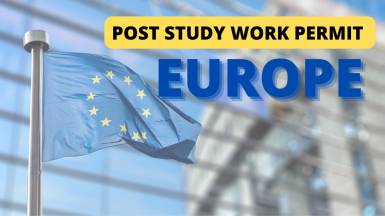Post-Study Work Opportunities in Europe: A Guide to Employment Options and Visa Regulations
 Posted date: 16 Apr 2024
Posted date: 16 Apr 2024
Embarking on a journey to study in Europe not only promises an enriching academic experience and opportunities in Europe but also opens doors to diverse post study work opportunities. From bustling metropolises to picturesque countryside locales, Europe offers a plethora of employment options for international graduates. However, understanding the intricacies of post study work visa regulations and employment landscapes is crucial for a seamless transition from student life to professional endeavors.
Exploring Employment Options:
-
Industry Diversity: Europe boasts a vibrant job market across various sectors. For instance, according to Eurostat, the leading industries in the EU include manufacturing, healthcare, information and communication technology (ICT), professional services, and finance.
-
Start-up Ecosystem: Many European cities have emerged as hubs for start-up innovation. Berlin, for example, is home to over 3,500 tech start-ups, making it one of Europe's leading tech hubs. London and Amsterdam also feature prominently in the European start-up scene, offering opportunities for entrepreneurial-minded graduates.
-
Research and Academia: European universities and research institutions offer numerous opportunities for post-doctoral positions, research fellowships, and teaching roles. For instance, the European Research Council (ERC) funds research projects across various disciplines, providing avenues for further academic and professional growth.
-
Internships and Graduate Programs: Internships and graduate programs are excellent avenues for gaining practical experience. Many European companies, such as Siemens and Volkswagen in Germany, offer structured internship programs tailored for recent graduates, providing valuable insights into the industry and potential pathways for permanent employment.
Understanding Europe post study work visa Regulations:
-
Post-Study Work Visas: Several countries offer post study work visa in europe. In the UK, for example, international students can apply for the Graduate Route visa, allowing them to stay and work in the UK for up to two years after graduation. Similarly, Ireland offers a Stamp 1G visa, enabling graduates to work in Ireland for up to two years.
-
Job Search Visa: Germany offers a dedicated visa for graduates to search for employment after completing their studies. The Job Seeker Visa grants graduates a period of up to 18 months to secure a job relevant to their qualifications.
-
Work Permit and Residence Permit: Once you secure employment, you may need to apply for a work permit or residence permit, depending on the country's regulations. In France, for instance, non-EU graduates can apply for a "Skills and Talents" residence permit, allowing them to work in the country.
-
Language Requirements: Proficiency in the local language can significantly impact your job prospects in certain European countries. While English is widely spoken in many professional environments, fluency in the local language may be necessary for certain roles and industries.
-
EU Blue Card: The EU Blue Card is a work and residence permit designed for highly skilled non-EU citizens. To qualify for the EU Blue Card, you must have a job offer with a salary above a certain threshold and meet other eligibility criteria set by the respective country.
Navigating post study work opportunities in Europe requires a combination of strategic planning, cultural adaptation, and understanding of visa regulations. By leveraging the diverse employment landscape and familiarizing yourself with visa requirements, international graduates can embark on a rewarding professional journey in Europe. Whether pursuing a career in technology, academia, or entrepreneurship, Europe offers a wealth of opportunities for ambitious individuals seeking to broaden their horizons and contribute to the global workforce.
Posted By

GSP Admin




